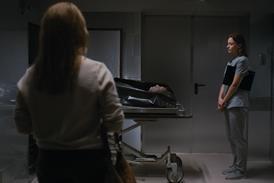Dir: Julie Bertuccelli. France-Belgium. 2003. 102mins
The modest but solid debut of French film-maker Julie Bertuccelli, Since Otar Left should be considered closely by festivals looking for a film that connects with audiences while admirably resisting every temptation offered by its touching story to plunge into bathos by over-plucking the heartstrings. The film is set in Tblisi, the capital of the former Soviet republic of Georgia, meaning approximately 80% of its dialogue is in Georgian, and with a soundtrack that sports a lot of very peppy traditional folk music, it could prove a boon for festivals looking to enhance their multicultural appeal. Given its unknown cast, limited means, and the unfamiliarity of most Western audiences with the region, however, its commercial appeal will be minimal, although may receive a slight boost from the film taking the top prize in Critics' Week.
The film centres around a Tblisi household that consists of Grandma Eka, daughter Marina and grand-daughter Ada. As victims of the new Georgian economy, the family is strapped for cash and the little money that Otar, Eka's beloved son, sends them from his illegal job in Paris is crucial to their survival. Eka is also psychologically dependent on her absent son, and has erected a virtual shrine to him in their cramped apartment. When his occasional calls and letters arrive, everything else stops dead. One day, Marina and Ada learn that Otar has been killed in an accident at his workplace. They decide to keep this knowledge from Eka on the quite plausible grounds that it might kill her. The expected complications ensue, but the storyline in no way feels cliched or predictable. The grand climax comes when Eka takes off for Paris, dragging Marina and Ada along with her, in search of her son.
The characters are always believable without being especially original. Thus Eka is curmudgeonly, yet with a heart of gold; the forty-something daughter is overly dependent on men and sneaks food to get some pleasure in her life; and the grand-daughter is frustrated by the limited prospects available to her in present-day Georgia. What is most noteworthy about this particular family (and most baffling until it is explained about 30 minutes into the film) is that they are raging Francophiles, which accounts for their collection of precious old French books that figures centrally in the plot, and the fact that much of the dialogue is in French, even while they are still at home in Tblisi.
Director Bertuccelli makes a few minimalist nods toward a political theme (contrasting the frustrations of Ada and Marina as a generational one related to the inertia left behind by the failed communist system), but this is never seriously followed up.
Most crucially, the film's divided focus on the various unhappinesses and frustrations of the three women, while structurally satisfying, tends to limit the emotional impact of the movie as a whole. Although the film drags a bit here and there, the script is often clever, the three central roles are impeccably acted, and there are plenty of well-directed, touching little moments to keep viewers going.
Prod co: Les Films du Poisson
Int'l sales: Celluloid Dreams
Fr dist: Haut Et Court
Prod: Yael Fogiel
Scr: Julie Bertuccelli, Bernard Renucci, Roger Bohbot
Cinematography: Christophe Pollock
Prod des: Emmanuel de Chauvigny
Ed: Emmanuelle Castro
Main cast: Esther Gorintin, Nino Khomassouridze, Dinara Droukarova


















No comments yet